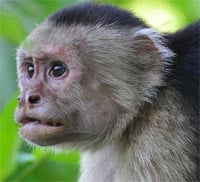Monkey See, Monkey Bite
As if we needed another reminder that wild animals are not wind-up toys, a capuchin monkey reportedly being kept as a “service animal” by a man in Chesapeake, Virginia, bit the man so severely that he had to be hospitalized. A video that aired on a local news broadcast showed the monkey’s cage and the floor surrounding it sprayed with the man’s blood.
Dangerous attacks are just one of the many downsides to keeping primates as “pets” (remember Travis?) and/or using them for assistance or therapy. Monkeys who are trained for Helping Hands, an organization that provides monkeys to quadriplegics and other physically disabled people, are torn away from their mothers within days or weeks of birth—separations that are extremely traumatic for both mother and baby. Because monkeys are known to be prone to biting, some or all of the monkeys’ teeth are usually pulled. (The Chesapeake man apparently did not obtain his monkey from Helping Hands, because the monkey’s teeth appear to be intact.)
Capuchin monkeys are intelligent and highly social animals who naturally live in groups and spend most of their time in trees. In the jungles and forests where they belong, capuchins raise families and have intricate communication systems. They race through tree canopies with astonishing speed and accuracy. Because they are extremely active, messy, and destructive, captive capuchins often spend much of their time confined, alone, to cages—a far cry, both literally and figuratively, from their vibrant jungle homes.
No one can debate the tremendous challenges faced by disabled people, but forcing monkeys to bridge the gap is not the most humane—or the safest—answer. With so many people having lost their jobs during the economic downturn, it seems like it would make more sense to hire them as “helping hands” than to continue to force monkeys into a lifetime of servitude far from their families and natural habitats.
Written by Alisa Mullins


